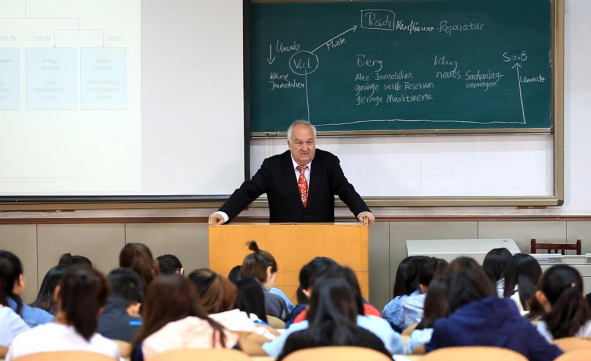Education
Professor Rainer Eigenstetter spends half of the year in China
“I'm really looking forward to going back to China soon. The city of Taiyuan is my hometown.” Professor Rainer Eigenstetter enjoys talking about his work in China, his life in Shanxi province, and his home in Taiyuan. Working with Chinese students is his purpose in life. That is why he has been working for FOM University in China for 14 years and is responsible for the university's business studies in China as head of academic studies. His office is located on the campus of the Shanxi University of Finance and Economics (SUFE) in Taiyuan.

Professor Rainer Eigenstetter
“Chinese students are warm-hearted and hardworking”
Usually, Eigenstetter spends half of the year in China. His working days are as filled to the brim in China as they are in Germany - with lectures, with the preparation of new teaching materials and with keeping in touch with academic partners. He is also in demand as an advisor for his colleagues and for the tutors, and he really enjoys his work. "Otherwise I wouldn't have stayed in China for so long," says the Bavarian from the Isar Valley, who also appreciates the warmth of the Chinese students: "They always show us teachers a lot of respect."
The economist, who worked for a major German bank as an industry analyst and financing specialist for more than 20 years before joining FOM, thinks highly of the Bachelor's and Master's graduates. "They have mastered a demanding international degree, developed their personality and stand out from the crowd," says Eigenstetter, who repeatedly shows the young Chinese individual professional perspectives. "For our graduates, I am not only their professor, but also the uncle or maybe also the Grandpa with the good tips," laughs the Bavarian.
Since he was a child, he has been fascinated by the country. “As a little boy, it was all very exciting for me - that’s why I went to China and stayed there for so long. I would like to keep this task for a very long time because in China I have the opportunity to adapt the technical content to changing needs and new requirements. The university cooperation program offers this opportunity in a unique way.” Moreover, it is fascinating for him to experience economic progress firsthand, “and I have had very good experiences with a lot of very nice people. You can feel a great warmth.”
The socio-economic and cultural point of view
More and more Chinese young people are attending universities. Competition among graduates for attractive jobs is soaring. “It is therefore very important for the students that they not only pass the exam with very good results, but also stand out from the other students with special skills and knowledge", says Eigenstetter.
For many young people and their families, it is a good idea to choose a course of study with an international dimension that includes the possibility of studying abroad - in Germany, for example. It is difficult to assess which specialization will be particularly in demand in the Chinese labor market, but one can still safely assume that knowledge of digitization and its implementation in business, as well as a knowledge of structural change, will be very important. "It is also important that the students not only acquire specialist knowledge, but also achieve a high level of problem solving skills."
In a country as huge as China, everyone can only make a small contribution to progress. “But what I see and can also prove is the professional success of many of our graduates. I have a lot of conversations with former students and they confirm to me that they have made great personal progress in their studies and that they can bring a lot of it to their job”, says Eigenstetter.
The most important experience for him is the cooperation with their partner university in the content and in the didactic development of their course. “Here, we really did a great job together. It's been a giant leap from the very beginning to this day.” Especially under the current special conditions, with lectures taking place online, it's important that partners pull together. “The online lessons worked extremely well. The technology is terrific. You don't even notice that you are thousands of kilometers away right now,” enthuses Eigenstetter. "Everything was implemented so quickly that not a day, not even an hour, was missed for the students. The cooperation with our Chinese partners worked extremely well during this special time."
Trends in China's higher education over the coming years
Eigenstetter sees two major trends in China's higher education. The first trend is towards a strong specialization of studies: “I see an increasing range of specialized subjects at our partner universities. This applies not only to the master's degree programs, but also to the bachelor's degree programs.” The second trend might be that practical relevance and exposure to macroeconomic developments are to be steadily more integrated into the course content. A good example is the great importance of the different forms of economic and technical structural change in the teaching and research focus of partner universities. “Here we can of course also bring in our research results from Germany and make a valuable contribution.”

Eigenstetter gives a lecture in China
The future of German-Chinese university cooperation
In Eigenstetter’s opinion, there is no general answer to the question of what the future of German-Chinese university cooperation will look like. But he can answer that for individual cooperation. "That is where university collaborations are no different from collaborations in industry," he said. "If both partners work together trustingly with all their might and if progress is visible for both partners, then the cooperation will continue successfully. This applies to the cooperation that I've been working on for many years.” But of course, there will also be Chinese-German collaborations that will not be as successful. What is more important is that there will be other forms of cooperation. That could be a new subject matter, new use of technology or other skills.
Bringing Bavarian traditions to Shanxi province
If he has his way, his professional focus in the coming years will also be in Taiyuan. "If I stay fit, I'll keep going," says Eigenstetter, looking forward to the challenges of the future and hoping that he can further bring Bavarian traditions to China. "I brought traditional Bavarian cuisine to Shanxi province," reveals the professor. "Delicacies such as apple strudel, gingerbread, bread dumplings or finger noodles are simply part of it here in China. And I would really like to show my Chinese friends and students how good Bavarian liqueurs or homemade cookies taste. I will certainly have time for that in the years to come."

Copyright 1995 - . All rights reserved. The content (including but not limited to text, photo, multimedia information, etc) published in this site belongs to China Daily Information Co (CDIC). Without written authorization from CDIC, such content shall not be republished or used in any form. Note: Browsers with 1024*768 or higher resolution are suggested for this site.
Registration Number: 130349









